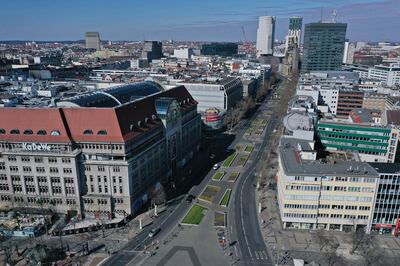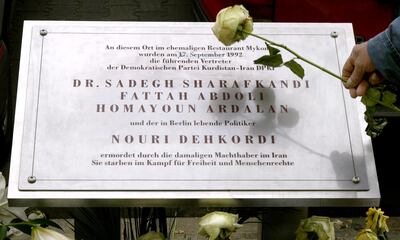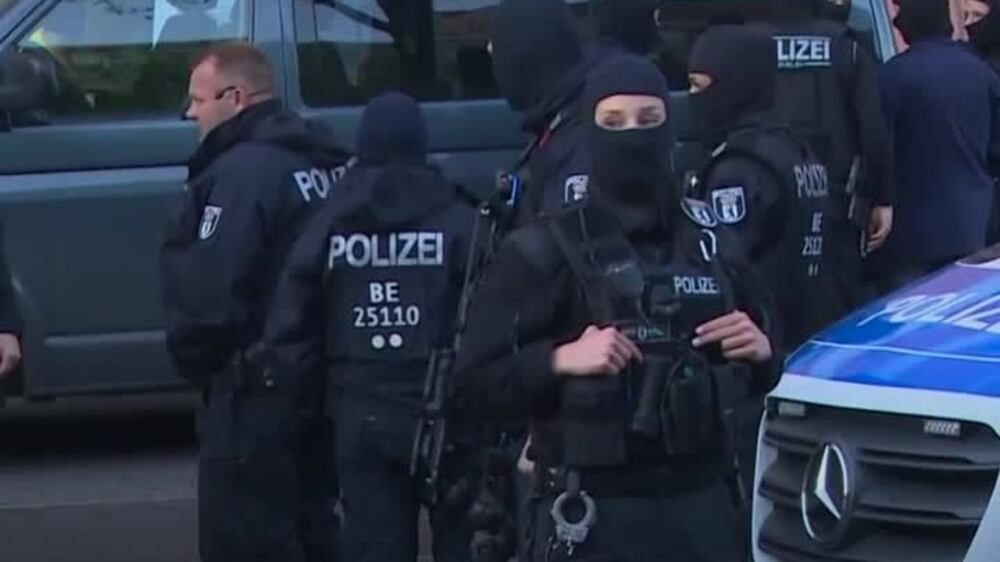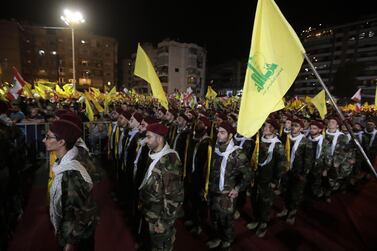At the end of every Ramadan, Hezbollah followers in yellow bandanas wave flags and march through the heart of West Berlin to commemorate a call by former Iranian supreme leader Ayatollah Rohollah Khomeini to restore Palestinian rights in Jerusalem.
Giant loudspeakers on Kurfurstendamm, next to a statue of Konrad Adenauer, father of Germany’s post-war democracy, blare songs in Arabic laced with anti-Semitism and calls to destroy Israel.
Ku’damm, as the thoroughfare is fondly called, was a centre of the 1920s and of German Jewish business families who perished among the six million Jews in the holocaust.
When the next Al Quds Day comes in a fortnight, the same Hezbollah followers might think twice about turning up to this act of provocation, in fear of breaking new laws pushed through by the country’s interior minister.

Germany designated the whole of Hezbollah a terrorist organisation on Thursday, ending a distinction between the group’s armed wing and the rest of the organisation
Berlin became the second European government to break away from EU policy of distinguishing between Hezbollah’s militiamen and its political wing.
Police raided buildings and made arrests across Germany on Thursday, in a campaign against 1,050 Hezbollah operatives who the Interior Ministry said were in the country.
On a visit to Berlin last year, US Secretary of State Mike Pompeo said Washington hoped Germany would follow Britain in banning Hezbollah, joining Saudi Arabia in urging action.
Britain introduced legislation in February 2019 that classified all of Hezbollah as a terrorist organisation.
France, which has been leading with Germany a European drive to accommodate Iran, has only a partial ban on Hezbollah.
But German officials in Berlin told The National that the German move was mainly prompted by the Interior Minister, Horst Seehofer.
“Seehofer acted but the German security services have not been blind to the presence of Hezbollah,” one official said.
Mr Seehofer, a right-of-centre politician from Bavaria and ally of Chancellor Angela Merkel, has sought since his appointment in 2018 to counter what he calls a soft German line on terrorism.
His decision went against many in the German establishment and Berlin’s influential think tanks, who have been advocating open channels with Hezbollah.
These players have been arguing that Hezbollah’s presence in the Lebanese government and legislature gives it legitimacy and as such the group’s status in Germany should not be touched.
Mr Seehofer had purely domestic political and security considerations in mind, the sources said, including electoral gains by the extreme right in recent years.
Mr Seehofer has dealt a blow to Iran through the legislation.
Tehran relies primarily on Hezbollah and the rest of its militia allies in the Middle East in its foreign policy.
But Hezbollah’s presence in Europe’s largest economy is important for logistical purposes and to keep connection with, and funding from, sympathisers living away from home.
Many of the group’s members and followers in Germany are refugees who fled in the 1980s during the Lebanese civil war, and their descendants.
Official sources said Hezbollah had done itself no favours in Germany through the increased activities of charities associated with the group in the past five years, along with its higher profile on the streets and among Muslim communities.
They said Hezbollah’s operatives were careful to appear law-abiding and none appear to have been linked to any recent violence in Germany or assassinations and attacks in Europe against Iranian dissidents since 2017.

But not far from Ku’damm, a plaque on Pragerstrasse commemorates three non-violent Iranian-Kurdish dissidents assassinated in 1992 in Operation Mykonos, named after the site of the restaurant where they were gunned down with their interpreter.
The assassins, an Iranian intelligence agent and a Lebanese Hezbollah operative, were released under murky circumstances from a German jail in 2007 and sent to Iran.








